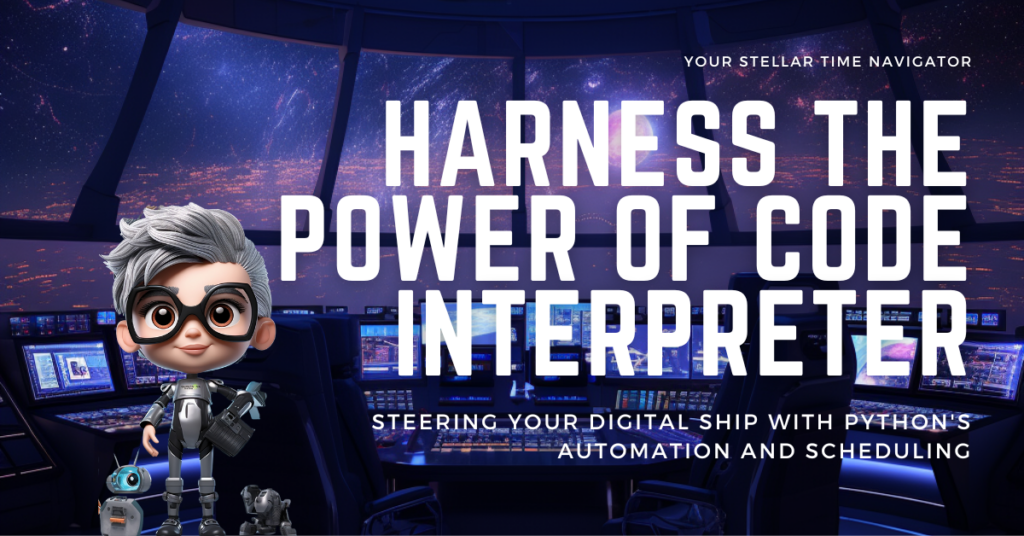|
Getting your Trinity Audio player ready...
|

Greetings, fellow cosmic voyagers! Welcome back to another intriguing chapter of “Jupiter Journals”. On our last cosmic journey, we delved into the Python universe and its interactions with an array of file formats, everyday apps, and Code Interpreter. Today, we’re setting our sights further into this cosmos. Let’s delve deeper into the black hole of possibilities and uncover how Python, with the power of Code Interpreter, transforms into your interstellar Taskmaster – specializing in the art of automation and scheduling. Buckle up!
Automation, as we all know, is like having a well-oiled robot on our spaceship, dutifully taking over routine tasks and freeing us, the astronauts, for more important missions. Scheduling, on the other hand, ensures that this robot knows exactly when to perform these tasks. It’s all about saving time, increasing efficiency, and, of course, making our space travel smoother.
So, how does Python fit into this?
Python: Automating Your Cosmic Duties
Python, especially when using Code Interpreter, is like your cosmic robot, ready to take on many tasks that you’d usually have to do manually. It’s like having an extra pair of hands that never gets tired.
For example, Python can organize your digital files just the way you want. Need to rename a file? Python can do it. Create a new folder? Python is on it. Want a list of all the files in a folder? Python’s got you covered. In short, Python is like your very own space assistant, making sure your digital space is always in order.
Python: Your Scheduler in Time and Space
Imagine Python as your personal space-time navigator, able to schedule tasks to happen just when you want them to. Want to run a task every day at the same time? Python can handle it. Need something done every few hours? Python is ready.
However, keep in mind that in Code Interpreter, Python’s space station, there might be some limits. Some tasks that need to run for a long time, or that need to wait for a specific time to do something, might not work exactly as you expect. It all depends on how the Code Interpreter handles things. But don’t worry, Python still has plenty of tricks up its sleeve!
To round off our journey today, I want to give you a glimpse of the exciting destinations we’ll be visiting next in our “Jupiter Journals” series. Hold onto your helmets because we’re about to dive into practical uses of the Code Interpreter, showing you how to command Python to perform a variety of tasks with everyday apps:
- Google Drive: We’ll learn how Python can act as your personal space courier, managing files in your Google Drive.
- Dropbox: Like an interstellar dropbox, we’ll see how Python can aid in uploading, downloading, and sharing your documents.
- Microsoft Excel or Word Online: Watch as Python, our skilled diplomat, interacts with documents or spreadsheets in Microsoft’s online suite.
- Gmail: Python will become your personal space postman, sending emails through Gmail, and even reading and processing incoming messages.
- Twitter: Learn how to send cosmic signals as Python tweets, retweets, or likes posts on Twitter.
- Facebook: We’ll turn Python into your social media manager in the cosmos, managing your Facebook feed.
- Slack: See Python become your intergalactic communicator, sending messages, uploading files, or creating channels on Slack.
- Trello: Python will transform into your space project manager, creating cards, lists, or boards on Trello.
- Evernote: Like a cosmic scribe, Python will create, read, and edit notes in your Evernote account.
- IFTTT: We’ll orchestrate space automation, triggering or responding to IFTTT events, allowing us to automate tasks across different apps and devices.
So stay tuned, fellow explorers, as we prepare for these thrilling voyages into the practical applications of Python with Code Interpreter. We’re just getting started with this cosmic dance of automation and scheduling, and we have many more galaxies to explore!
Until our next space-time rendezvous, keep exploring the limitless opportunities that our data cosmos offers. Remember, in Python’s universe, the sky is not the limit, it’s just the beginning.
Signing off for now,
Captain Nancy


















